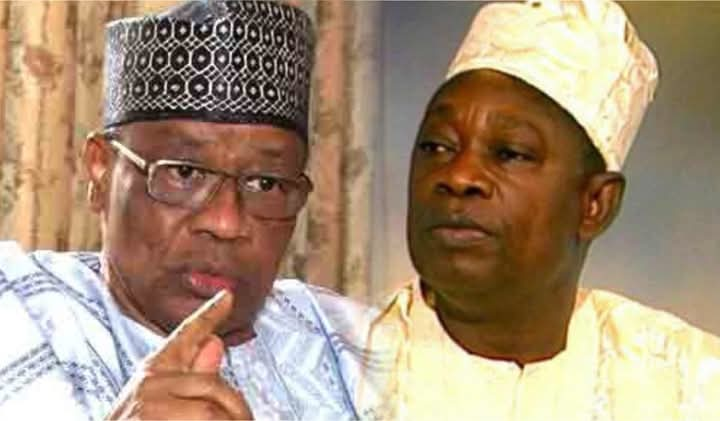
Why I annulled June 12, 1993 Presidential election – IBB
Why I annul June 12 Presidential election – IBB
Former Military President Ibrahim Badamasi Babangida (IBB) has expressed regret over the annulment of the June 12, 1993 Presidential election, saying he would do things differently if given another chance.
He said this during the launch of his autobiography – “A Journey in Service”, in Abuja, on Thursday.
Speaking after former Vice-President Yemi Osinbajo reviewed the book, IBB took responsibility for the cancellation of the exercise which was a two-horse race between Abiola, candidate of the Social Democratic Party (SDP), and Bashir Tofa of the National Republican Convention (NRC).
“I regret June 12. I accept full responsibility for the decisions taken and June 12 happened under my watch. Mistakes, missteps happened in quick successions,” he said.
In an interview which he previously granted, IBB had defended annulment of the June 12 election.
While saying he agreed that it was free and fair and also the best of all elections ever conducted in Nigeria’s history, he said Nigeria was not ready for a democratic rule as of the time the election held.
“June 12 was accepted by Nigerians as the best of elections in Nigeria. It was free and fair. But unfortunately, we cancelled that election. I used the word unfortunately, for the first time. We were in government at the time and we knew the possible consequences of handing over to a democratic government. We did well that we wanted ours to be the last military coup deta’t. To be honest with you, the situation was not ripe to hand over at the time.
“Forget about the wrong things that happened in politics. The issue of security of the nation was a threat and we would have considered ourselves to have failed, if six months after handover, there was another coup. I went through coup deta’t and I survived it. We knew that there would be another coup deta’t. But not many people believed what we said. They could have allowed me to go away and then they (coup plotters) would regroup and stage another coup. This is how coups are staged – one man will always come to complain. And he will try to convince you about his complaints,” Babangida said.
He said security threats to the advent of democracy at the time culminated in fresh plans to conduct another election within another six months after June 12 annulment, with better strategy, but which he said he could not achieve as a result of the hostility which accompanied the cancellation. According to him, another election was conceived to come up in November 1993.
He revealed further that he was determined to conduct another election which culminated in the constitution of an Interim National Government (ING), which he noted was eventually toppled by a military coup staged by General Sani Abacha.
The book, which offers insights into key moments in the country’s history, also addresses other national controversies, including the 1976 coup attempt that led to the assassination of then-Head of State, Murtala Muhammed, and the 1986 letter bomb that killed investigative journalist, Dele Giwa.
Thursday’s event marked the official launch of General Babangida’s official memoir, ‘A Journey in Service’.
It drew an elite gathering of past and present leaders who reflected on his legacy and the state of democracy in West Africa.
Discussions ranged from Babangida’s contributions to Nigeria’s political history to concerns over the resurgence of military coups in the region.
In his keynote address, former Ghanaian President Nana Akufo-Addo emphasised the importance of multi-party democracy in Africa’s development.
He warned against the growing wave of military takeovers, calling them a setback to democratic progress.
“Multiple parties are good for our continent,” Akufo-Addo said, urging leaders to protect democratic institutions.
Former Nigerian Head of State, General Yakubu Gowon (retd.), lauded Babangida’s rise from aide-de-camp to head of state, describing him as a “boss of bosses.”
Gowon also expressed gratitude for Babangida’s decision to restore his rank of General after it was stripped following the 1976 coup.
The former head of state said, “Thank you for restoring my rank,” reflecting on how Babangida’s leadership impacted his life.
Meanwhile, General Abdulsalami Abubakar, another former military president, shared personal anecdotes about his long-standing relationship with Babangida, which, he said, spans over 80 years.
Abdulsalami recalled a childhood prophecy that foretold Babangida’s rise to power and commended him for documenting his life’s journey.
“Your memoir will enrich the country,” Abdulsalami stated.
For his part, former President Goodluck Jonathan described Babangida as one of Nigeria’s most charismatic leaders and called for the creation of presidential libraries to preserve the country’s political history.
“IBB brought us here today to celebrate his book and library.
“His home has become somewhat of a pilgrimage site,” Jonathan noted.
Representing immediate-past President Muhammadu Buhari, ex-Minister of Transportation, Jaji Sambo, delivered a congratulatory message, expressing hope that Babangida would continue offering valuable counsel to Nigeria’s leadership.
Various dignitaries and businessmen such as the Chairman of the Dangote Group, Aliko Dangote and the Chairman of BUA Group, Abdulsamad Rabiu, launched the book with N8bn and N5bn each.
Dangote pledged to donate N2bn annually for four years for the construction of the IBB Presidential Library.
Meanwhile, Senator Sani Musa, representing Niger East Senatorial District, donated N250m; the Fidelity Bank leadership launched the book with N150m, while Businessman Arthur Eze donated N500m
